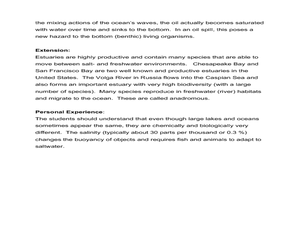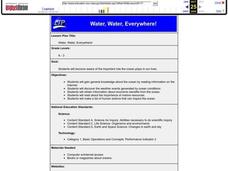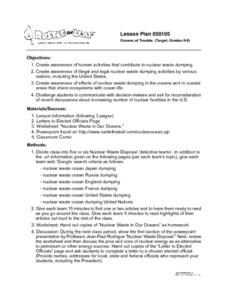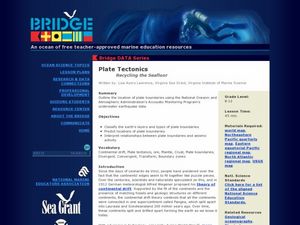Curated OER
$$$eaweed
Pupils compare and evaluate the world's different seaweeds. In this investigative lesson students study seaweed and the harvesting of it. They then interpret the data collected and graph the seaweed production.
Curated OER
"Five Little Seeds"
Fourth graders complete various activities related to the plant life cycle. They read the book "The Tiny Seed," read and discuss the poem "Five Little Seeds," complete a "Plantenstein Mystery" and other online activities, write and...
Curated OER
Stranded along the Coast
Students plot stranding sites onto a map using latitude and longitude as well as compass directions with respect to coastal features. They identify several species of marine animals that might become stranded; distinguish their...
Curated OER
Cool Lights
Students investigate how and why deep-sea organisms produce light. They examine how these processes can be used to study deep ocean environments.
Curated OER
Primary Producers
Students examine the role of carbon in the oceans and how phytoplankton determine the levels present. In groups, they practice measuring primary productivity using two methods. They use the internet to research the role of phytoplankton...
Curated OER
Going for the Green
Students use satellite imagery to obtain information on chlorophyll concentration at selected locations in the Earth's oceans.Students explain the relationship between chlorophyll concentration and primary production.Studen
Curated OER
When Fish Die
Learners discuss what to do with a very sick fish and help it to die without much pain. As a class, they answer questions about the fish and if they believe it is suffering or not. Using their own experiences, they share how they dealt...
Curated OER
Gone Fishing
Students examine the effects of various methods of fishing on fish populations and biodiversity. They read a handout, participate in a simulation of different fishing methods, record the results, and answer discussion questions.
Curated OER
Teacher's Guide For: Water Temperature and Salinity Experiment
Students experiment with water density, temperature and salinity. In this water instructional activity, students observe how the coldest water sinks to the bottom of a test tube, and how saltwater sinks in comparison to freshwater.
Curated OER
Time Travel
Fourth graders become familiar with the early explorers of our state. In addition, they conceptualize life during the 1800's in relation to their own personal histories and knowledge of 19th century events.
Curated OER
Search for the Humpback Whale
Students work in teams to research and explore whale adaptations, behavior, migration, habitat, communication, and interactions with humans and present their findings.
Curated OER
Learning About Bears And Dolphins
Seventh graders engage in a study that compares the body structures of bears and dolphins. They conduct research to find information and use questions to find the differences or similarities and then conduct a class discussion about the...
Curated OER
Water, Water, Everywhere!
Students become aware of the important role the ocean plays in our lives. Students will gain general knowledge about the ocean by reading information on the Internet. They discover the weather events generated by ocean conditions.
Curated OER
If I Can't See It, How Do I Know It's There?
Students build a model ocean using a variety of materials representing the various levels of the ocean. They collect data about the ocean floor in a partner activity. They practice working with topographical mapping grids.
Curated OER
Going to Extremes
Students recognize that our ability to explore the extremes of the ocean is directly related to the technology of remote sensing. Students will recognize the deep submergence vehicle, Alvin, and the advanced sensors on board as tools for...
Curated OER
Oceans of Trouble
Pupils investigate the illegal and legal nuclear waste dumping activities by various nations, including the United States. The effects of nuclear waste dumping in oceans and in coastal areas that share ecosystems with ocean life is...
Curated OER
Plate Tectonics: Recycling the Seafloor
Learners classify earth's layers and plates using Ocean Seismicity data. In this plate tectonics lesson plan, students outline where the plate boundaries are on the world map. They then compare these predicted boundaries with USGS map of...
Curated OER
Ring Detectives
Students describe the overall flow of the Gulf Stream, and explain how it affects biological communities in the North Atlantic Ocean.Students describe Gulf Stream rings, and explain how they are formed.Students be abl
Curated OER
pH Readings and Salinity Readings of Water From Three Locations Within the Neponset River Watershed
Sixth graders test the ph levels of water from three different water environments within the Neponset River Watershed. They discuss the three different water environments, take pH measurements of the three samples, and predict which...
Curated OER
Coastal Biodiversity of South Africa
Students investigate the biodiversity found along the coast of South Africa. They conduct research using a variety of resources. They use the information in order to write lab reports with the data. The lesson can be adapted to other...
Curated OER
Salmon Run
Students examine the life cycle of the Pacific salmon and the impact of humans on salmon migration. They watch a Powerpoint presentation, trace migration routes on satellite imagery, and complete mock calculations of salmon energy...
Curated OER
The Incredible Journey
Learners study salmon and steelhead. They play a game in which they act out the salmon and steelhead journey from their spawning ground, to the open ocean, and then back to the spawning ground again. They identify obstacles these fish...
Curated OER
Who's Your Neighbor?
Students recognize and identify some of the fauna groups found in deep-sea coral reef communities. They describe common feeding strategies used by benthic animals in deep-sea coral reef communities.Students be able
Curated OER
Twisted Vision
Students explain polarization vision and why some animals have it while others do not. They examine the reasons why it would be helpful for marine organisms to have polarized light.

























